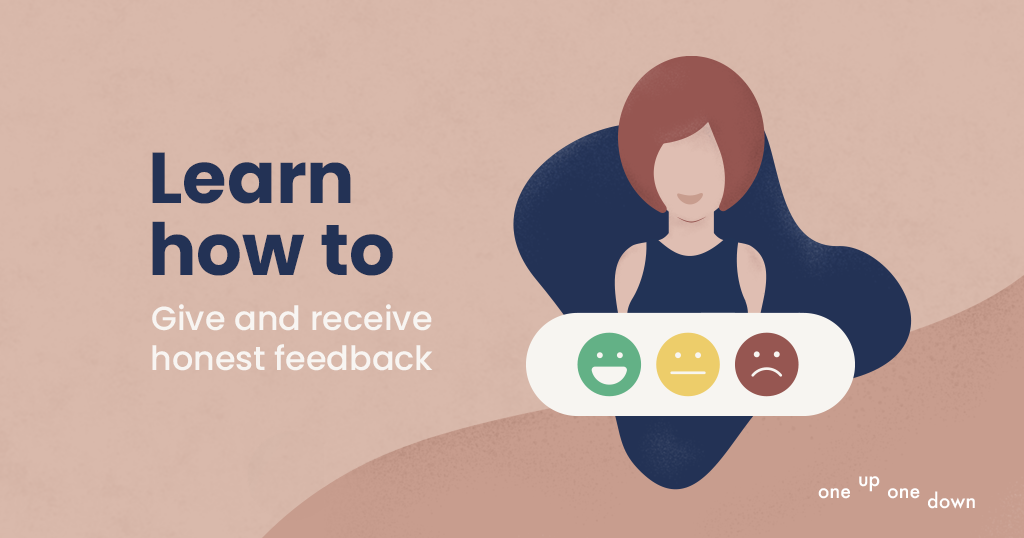At OneUpOneDown our mission is to transform the way people connect, by facilitating and teaching the profound practice of mentorship. A wonderful thing about mentorship is the rich learning experience it offers, not only from the direct advice that is shared but also through the development of practices to build effective relationships.
Learning to give and receive feedback is one of these lessons.
Providing honest feedback is an important part of forming authentic relationships. It’s a way to build trust and to open each other up to receiving and providing perspectives and learnings. In doing so, you are able to exchange valuable information to support personal growth. The more honest and true the knowledge that you receive, the more valuable it is for your growth. The same goes for the person you are working with.
Supporting each other is another primary reason why we’re all here engaging as mentors and mentees – to help each other grow and flourish.
But getting and asking for feedback isn’t always easy, especially when it’s someone that you’ve only really just met. So how do you ask for and offer feedback in a way that is enjoyable and useful for you and your mentor or mentee?
Ultimately, this is about your state of mind, as well as the practices you implement. In this blog post, we focus primarily on your ‘state’, rather than the specific actions you should take to ask for or give feedback. If you’re looking for a specific action, please read our blog ‘How to give feedback to your mentor’.
Way of Being vs. Conscious Practices
All relationships are impacted by the participant’s Way of Being. Your Way of Being reflects what’s going on for you internally, encompassing your mental and emotional state, and any other internal influences that determine how you show up. Ultimately, this is what we should all be working on, as it impacts every aspect of your life, not just the task at hand.
One way to incorporate something into your Way of Being is by following a practice or progress until it becomes your natural state. Below we are going to bring some awareness to “Ways of Being” and practices to help you effectively share and receive feedback.
Tips for sharing and receiving honest feedback
Remove judgment within the mentor-mentee relationship
I have a theory, and that is that all fear is rooted in the fear of being wrong, unloved, or unworthy. This underlying fear creates a desire to protect ourselves, to prevent experiences that might act as confirmation. From this comes judgment, about how we look, sound, and engage with others. How we treat ourselves is usually reflected in how we perceive others, so the judgment and actions we take are realized in our relationships. This means we are less open to sharing what’s really going on, and less open to receiving wisdom to address it.
To create a relationship where all feedback is received and given freely and positively, it is important to create a space where judgment is removed. Where there is no fear of being “wrong, unlovable or unworthy”. In doing so, honest feedback can be given and received without the risk of offense.
I highly recommend reading our blog about ‘Essence Management & Image Management in Mentorship’ to learn more about the state of mind that will help you to show up in a state without judgment.
Reframe feedback
What comes to mind when you think about feedback? Is it you bracing yourself to give or receive feedback, anxious about how it might land. The feelings it will create for you or the other person, and how this is going to affect your relationship going forward, or what it indicates about you as a person?
Here’s one way to re-consider feedback.
Feedback is the exchange of information. It is how this information is delivered or received that determines its impact. This is determined by:
The emotional energy that surrounds the feedback, such as the anxiety that I described in the paragraph above.
The conscious decision by the receiver to act upon it, or not.
It is important to frame feedback as an informational input, that the receiver has control over, to determine whether she acts on it, or not. This applies to the feedback you give, and receive.
Understand your mentor or mentees goals, and help them to understand yours
The more clear you can both be about what you’re wanting to get out of the relationship, the more confident you will feel about giving feedback relating to these goals.
You can be proactive about this by sharing your own goals and the feedback that you’re wanting. For example, if one of your goals is to become better at mentoring, let your mentor or mentee know that you welcome any feedback that will help you with this goal.
Conclusion
Learning to give and receive honest feedback is fundamental as part of your self-improvement as a mentor or a mentee in a mentorship program. Cut out the judgment, the fear of being “not good enough” and let your honest inside voice speak.
Follow OneUpOneDown on Facebook, LinkedIn, Twitter and Instagram to stay tuned with the latest news.
